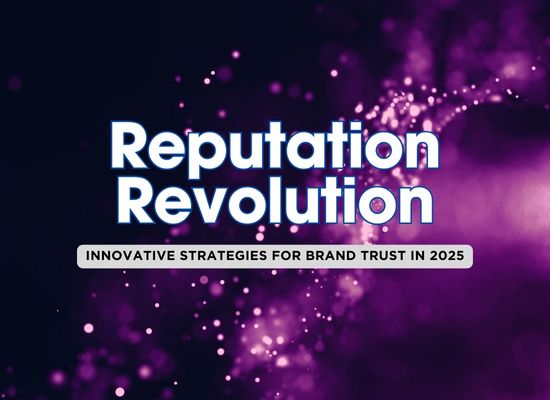Reputation management in 2025 is no longer about just responding to reviews or managing social media. It’s about leveraging cutting-edge tools and creative strategies to build trust, repair damage, and stand out in a crowded digital world. With AI advancements, consumer demands for authenticity, and the growing impact of influencers, businesses must adopt innovative approaches to safeguard their reputations.
1. AI-Powered Reputation Monitoring 🤖📊
Artificial Intelligence has become the ultimate ally for reputation management. Forget manually sifting through reviews or tracking mentions—AI now does the heavy lifting for you in real time.
- 🌍 Comprehensive Monitoring Across Platforms
- AI tools like Brandwatch or Mention scour the web for mentions of your brand, including on social media, forums, blogs, and even in competitor reviews.
- Bonus: They analyze tone and sentiment, giving you instant insights into public opinion.
- 🚨 Real-Time Alerts for Rapid Action
- Imagine being notified the second your brand is mentioned in a viral post—good or bad.
- This allows you to engage immediately, either to amplify positive mentions or to address potential crises before they escalate.
- 📈 Predictive Analytics for Future Planning
- Advanced AI tools now identify trends and predict potential risks. For instance, if negative sentiment is building around a particular product, you can preemptively address concerns.
Why It’s a Game-Changer:
- Saves countless hours of manual monitoring.
- Helps you stay proactive, not reactive.
- Turns reputation management into a strategic advantage rather than a firefighting exercise.
2. Influencer Partnerships for Reputation Building 🌟🤝
Influencers are no longer just marketing tools—they’re becoming reputation ambassadors. In 2025, the focus is on micro-influencers and authenticity, making this strategy more accessible and impactful.
- 👥 Micro-Influencers for Niche Credibility
- Micro-influencers (followers between 5,000–50,000) have higher engagement rates and stronger connections with their audiences compared to mega-influencers.
- They bring credibility to your brand, especially in niche markets where trust matters most.
- 📢 Authentic Messaging That Resonates
- Today’s consumers are quick to spot inauthentic promotions. Partnering with influencers who genuinely align with your brand values creates trust and loyalty.
- Example: A sustainable fashion brand collaborating with eco-conscious influencers for transparency and ethical messaging.
- 🔄 Collaboration Beyond Social Media
- Influencer partnerships now extend to co-creating content, hosting events, or even developing products (e.g., influencer-designed product lines).
Why It’s a Game-Changer:
- Builds credibility faster than traditional advertising.
- Reaches highly engaged, loyal audiences.
- Helps position your brand as authentic and relatable.
3. Proactive Crisis Management 🔥🛡️
In 2025, businesses can’t afford to wait for a crisis to happen. The new approach is to proactively prepare for and neutralize potential reputation risks before they escalate.
- 📊 Crisis Simulation Drills
- Companies are investing in mock crisis scenarios to test their response systems.
- These drills simulate social media backlash, negative reviews, or public scandals to ensure teams are prepared for real-life situations.
- Example: A food brand conducts a mock recall to refine its communication and logistical strategies.
- 🛠️ Reputation Risk Assessments
- Regular assessments identify vulnerabilities, such as product flaws or controversial policies, and create plans to mitigate risks.
- Tools like Crisis24 use AI to forecast how specific actions might affect public perception.
- 📱 Crisis-Specific Response Playbooks
- Businesses are creating detailed guides for handling specific crises, from data breaches to customer service failures.
- These playbooks include messaging templates, escalation procedures, and designated roles for response teams.
Why It’s a Game-Changer:
- Prevents small issues from snowballing into PR disasters.
- Reduces response time when a crisis occurs.
- Shows consumers you’re prepared, professional, and transparent.
4. Personalized Customer Engagement 💬🤝
Gone are the days of one-size-fits-all responses. In 2025, brands are focusing on creating personalized, meaningful interactions with customers to enhance loyalty and reputation.
- 👤 Tailored Responses to Reviews and Comments
- Generic responses like “We’re sorry for the inconvenience” are no longer acceptable.
- AI tools analyze customer data (purchase history, demographics, sentiment) to craft responses that feel personal and specific.
- Example: Instead of saying, “We’ll look into it,” a hotel responds, “We’re so sorry about the AC issue in Room 304. Our manager will contact you today to ensure it’s resolved before your next visit.”
- 📱 Conversational AI for Real-Time Interaction
- AI chatbots with natural language processing engage customers in real-time with personalized assistance.
- These tools help resolve complaints instantly, improving customer satisfaction and public perception.
- 🎉 Surprise and Delight Campaigns
- Brands are using customer data to surprise loyal customers with personalized gifts or messages.
- Example: A fitness brand sends a custom thank-you video to a customer who hit their 1-year membership milestone.
Why It’s a Game-Changer:
- Makes customers feel valued and heard.
- Turns negative experiences into positive ones.
- Builds long-term trust and loyalty, strengthening reputation.
5. Real-Time Review Monitoring 🚨🌟
In 2025, speed is everything. Real-time review monitoring allows brands to stay ahead of public opinion by tracking feedback as it happens and responding instantly.
- ⏱️ Rapid Response Advantage
- Tools like Google Alerts and ReviewTrackers notify businesses the moment a new review is posted.
- Quick responses show customers you care and can turn a negative review into a public demonstration of great customer service.
- 📈 Data-Driven Insights
- Monitoring tools don’t just collect reviews—they analyze trends, helping businesses spot recurring issues or opportunities for improvement.
- Example: A restaurant identifies consistent praise for a specific dish and uses it to launch a targeted promotion.
Why It’s a Game-Changer:
- Builds customer trust by showing accountability.
- Provides actionable insights for service or product improvements.
- Enhances your online presence with positive, visible interactions.
6. Transparency in Brand Communications 🕊️📢
In an age where authenticity is king, transparency has become a cornerstone of reputation management. Customers demand openness, especially around controversial or impactful topics.
- 🌱 Focus on Sustainability and Ethics
- Brands are being upfront about their efforts in areas like environmental impact, fair labor practices, and corporate responsibility.
- Example: A clothing company publishes detailed reports about its supply chain and carbon footprint.
- 📄 Own the Narrative
- Being proactive in addressing issues (rather than waiting for the media or consumers to spotlight them) builds credibility.
- Example: A tech company publicly announces its plan to fix a data privacy flaw rather than waiting for criticism.
Why It’s a Game-Changer:
- Builds trust with consumers who value honesty.
- Differentiates your brand in a competitive market.
- Turns potential crises into opportunities to demonstrate accountability.
7. Video Content for Reputation Building 🎥📱
Short-form videos have taken center stage in reputation management, offering a powerful way to engage audiences and tell authentic brand stories.
- 👀 Behind-the-Scenes Content
- Videos showcasing your team, production processes, or sustainability efforts build trust and relatability.
- Example: A coffee brand shares a short clip of farmers growing and harvesting beans ethically.
- 📣 Customer Stories and Testimonials
- User-generated video content, like testimonials or reviews, adds authenticity to your brand’s reputation.
- Example: A fitness company features customers sharing their transformation journeys on TikTok or Instagram Reels.
- 🎬 Crisis Address Videos
- In times of controversy, video messages from CEOs or executives humanize the brand and convey sincerity.
Why It’s a Game-Changer:
- Enhances relatability and humanizes your brand.
- Delivers messages more effectively than text-based content.
- Increases engagement on social platforms where video is prioritized.
Reputation management in 2025 is no longer reactive—it’s proactive, personal, and powered by technology. By adopting these innovative strategies, businesses can stay ahead of potential crises, build trust, and foster long-term loyalty.
From AI-driven monitoring to influencer partnerships and transparency-focused campaigns, these approaches aren’t just trends—they’re the foundation for navigating the ever-evolving digital landscape. Embrace these strategies to not just manage your reputation, but to elevate it. 🌟🚀



